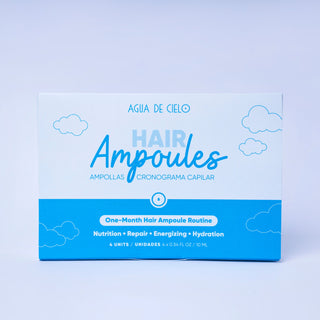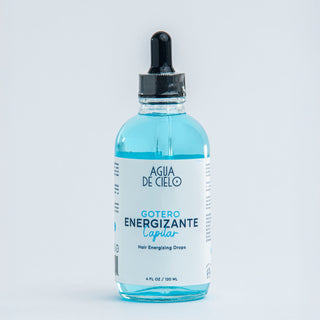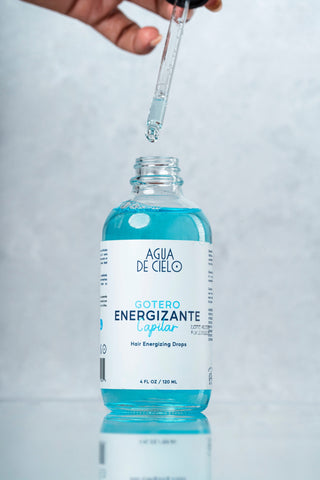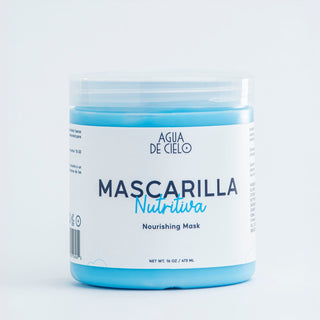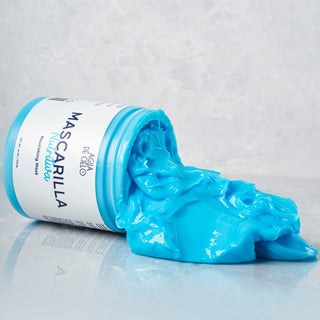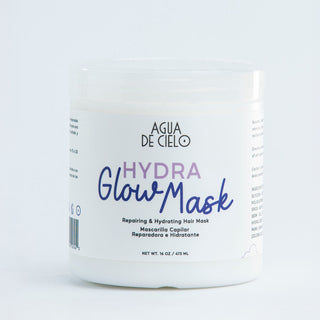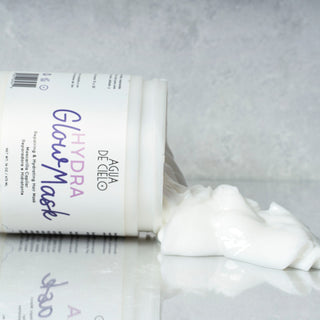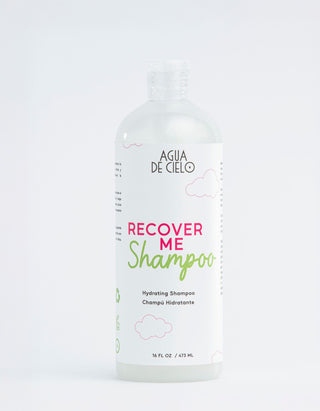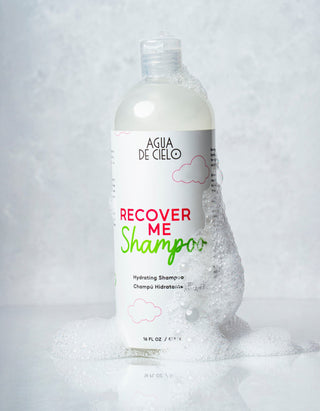Learn about the benefits of hair oiling, an ancient beauty secret that has been transforming hair care routines for centuries.
From fighting frizz to stimulating hair growth.
Hair oiling is a simple, yet powerful way to unlock the full potential of your hair.
Read along so you can learn about the benefits and how you can start your very own hair oiling routine today.
Table of Contents
What is Hair Oiling?
Hair oiling is a practice with deep roots in history, originating from ancient India over 5,000 years ago. It has been a ritualistic art in hair care, not only for its hair benefits but also as a form of self-care and relaxation. This traditional method passed down through generations, has become a global phenomenon.
But what exactly is hair oiling? It involves applying and massaging natural oils into the scalp and hair. The oil acts as a natural moisturizer that strengthens, protects, and adds shine. It's the ancient secret that has been maintaining healthier hair for centuries.
Read on to see how this age-old tradition can bring out the best in your hair's health and appearance.

Benefits of Hair Oiling
Hair oiling is much more than a simple beauty routine. It's your secret to protecting your hair and helping it stay healthy and beautiful. Here are some key benefits of hair oiling:
1. Keeping hair hydrated
Oiling your hair keeps it deeply moisturized. When you massage oil into your hair, it penetrates the hair shaft, keeping in moisture. This leaves your hair feeling soft and looking healthy, especially if you struggle with dryness.
2. Strengthening hair
Regular hair oiling can significantly strengthen your strands. It nourishes the hair from the inside, reducing hair breakage and making it strong and resilient. Over time, you'll notice your hair feels thicker and stronger.
3. Promoting hair growth
Massaging oil into your scalp can boost blood circulation, which is important for hair growth. This increased blood flow nourishes your hair follicles and helps it deliver nutrients to it better.
4. Improving scalp health
Oiling isn't just for your hair; it's great for your scalp too. It helps combat dryness, reduces dandruff, and soothes scalp irritation. A healthy scalp means healthier hair growth.

5. Adding natural shine
One of the quickest benefits you’ll notice is the natural shine. Oiling hair will keep your hair hydrated, nourished and strong. This will reflect on your hair leaving you with silky, smooth hair.
6. Preventing premature graying
Some oils are known for their properties that help keep your hair's natural color. Oiling hair can slow down the graying process by helping your hair stay hydrated and absorb key vitamins.
7. Taming frizz & split ends
If frizzy hair and split ends are your nightmares, oiling is your hero. It smoothes hair cuticles, taming frizz and helping to prevent split ends, making your hair more manageable. This also helps keep the hair protected from damage and breakage.
8. Protecting hair from damage
Hair oil forms a protective layer around each strand. This helps protect your hair from environmental stressors, heat styling, and harsh chemicals. Think of it as your hair's added shield.
9. Nourishing hair
Oils are packed with nutrients essential for healthy hair. They provide deep nourishment, ensuring your hair is well-fed and in top condition. As you go on with your day-to-day, your hair naturally loses nutrients. Oiling your hair can help restore these nutrients lost.
10. Reducing stress
The act of massaging oil into your scalp can be super relaxing. This not only benefits your hair but also helps in reducing stress, which is a known factor in hair health. This leads to faster and healthier hair growth. Want to learn more about the benefits of Scalp Massages? Read our blog here.
By embracing hair oiling, you're not just caring for your hair in the present. You're investing in its long-term health, beauty, and vitality.
How to Create Your Very Own Hair Oiling Routine
Adopting a hair oiling routine can be a game-changer for your hair's health and appearance. To get the most out of this practice, it's important to know the right techniques and best practices. Here's how to get started.
Steps for Your Hair Oiling Routine
- Preparation: Choose an oil that suits your hair type. Common options include coconut, castor, and argan oil. You can also use a blend of oils for added benefits, like our Everything Serum with jojoba, argan, castor and avocado oil.
- Application: Start by adding a few drops of your hair oil into your palms and start rubbing to warm up the oil. Apply oil directly to the scalp using your fingertips. Then, gently massage the oil into the scalp in circular motions. This not only helps in even distribution but also stimulates blood flow.
- Spreading: After the scalp massage, work the oil down the length of your hair, from roots to tips. This ensures that every strand gets the nourishing benefits of the oil.
- Comb through: Use a wide-tooth comb to evenly distribute the oil and detangle your hair. This step is especially important if you have long or thick hair.
- Leave in and enjoy: Leave the hair oil in your hair so that the hair absorbs the oil.

Hair Oiling Best Practices
How often to oil your hair
How often you should oil your hair depends on your hair type. Typically, oiling your hair once or twice a week is enough. If you have very dry hair, you might benefit from more frequent oiling. If you have very oily hair, you may want to oil even less frequently.
How long to leave in hair oil
Leave the oil in your hair for at least one hour. For deep conditioning or nutrition, you can leave it overnight. Just make sure to cover your hair with a cap or towel to avoid making a mess on your pillows. The duration you leave your hair oil in your hair depends if you are using an overnight one, pre-wash, or leave-in.
Best time for hair oiling
- Oiling before washing: This helps protect your hair from the harsh effects of shampoo.
- Oiling hair overnight: Some prefer to oil their hair at night and wash it off in the morning. The benefits of oiling hair overnight focus on deep hydration and nutrition of the hair.
- Oiling as a leave-in: Leaving hair oil in can help keep hair hydrated, nourished and protected from damage.
First, make sure what your hair goal is and adjust your routine accordingly.
Warming oils
Slightly warming the oil before application can boost its nourishing effects. Warm oil opens up the hair's cuticle layers, helping it penetrate the hair and scalp more effectively. This allows it to absorb more nutrients and offer greater benefits.
Post-oiling care
After oiling your hair, wash your hair with a gentle shampoo to remove excess oil. Avoid using hot water as it can strip natural oils from your hair and scalp. Ensure that oil is thoroughly rinsed out. Some non-water soluble oils can cause buildup on the hair if not removed.
Creating a personalized hair oiling routine can take some patience and practice. Pay attention to how your hair responds and adjust the routine accordingly. With consistent care, you'll soon see improvements in the health and beauty of your hair.
Common Mistakes in Hair Oiling
While there are many hair oiling benefits, there are also some common mistakes to avoid:
Using too much oil
More oil does not mean more benefits. Overdoing it can make washing it out difficult and leave your hair greasy and with buildup. A few tablespoons or drops should be enough, depending on hair length and thickness.
Not massaging the scalp
Simply oiling hair isn't enough. By not massaging oil into your scalp, you are missing out on the benefits of improved blood circulation. This is important for healthy hair growth. Think of it like putting soap on your hands without rubbing it through.
Using the wrong oil
Not all oils are suitable for every hair type or condition. For instance, coconut oil works great for some but can be too heavy for others. Other oils may be too thick for someone who has greasier hair. It’s important to choose an oil that complements your hair type.
Irregular oiling
Sporadic hair oiling won’t yield the desired results. Consistency is key. Create a routine that works for your hair and stick to it.
Not washing out oil properly
Leaving oil in your hair for too long or not washing it out properly is a no-go. It can lead to buildup, weighing down your hair, and possibly causing scalp issues.
Ignoring your hair type
Everyone’s hair is different. What works for one person might not work for another. Adjust your hair oiling routine to your hair’s specific needs. Consider factors like hair texture and scalp type. Don't know your hair or scalp type? Luckily, we wrote the blogs below.
Avoiding these common mistakes will keep your oiling routine effective. That way you are closer to getting nourished, strong, and healthy hair.
Great Hair Oils to Add to Your Routine
Choosing the right oil is key to a successful hair oiling routine. Different oils have different benefits. So it's important to select one based on your hair goals. Here are our top picks:
- Coconut oil: A classic choice, coconut oil is great for all hair types. It deeply conditions hair making it effective for dry, damaged hair.
- Argan oil: Known as 'liquid gold' for its rich yellow color. Argan oil is packed with antioxidants and vitamin E. It's great for taming frizz and adding shine. And is light enough for finer hair types.
- Olive oil: Olive oil is not just for cooking; it's also a great hair oil. It's rich in fatty acids and antioxidants. These help nourish the scalp, promote hair growth, and fight dandruff. It can also help strengthen and repair hair follicles.
- Castor oil: If hair growth is your goal, castor oil might be your best bet. It's known for its ability to stimulate hair growth and thicken hair. According to verywellhealth.com, "Applying castor oil just once a month can boost hair growth up to five times the usual rate". You can read more about Castor oil in our blog here.
- Almond oil: Perfect for sensitive scalps, almond oil is gentle yet nourishing. It's rich in vitamin E and helps in smoothing hair and adding shine. It can also make hair more manageable by restoring moisture.
- Jojoba oil: Jojoba oil is one of the most popular natural oils for hair care. Jojoba oil's composition is similar to the natural oils produced by our scalp. This makes it a great choice for balancing natural oil production, hydrating hair, and adding shine. It can even help stimulate hair growth and prevent dandruff.

You can try using the above oils individually or as part of blends. Whichever oil you choose, make sure it's high quality and preferably organic for the best results.
Conclusion
Hair oiling is an ancient beauty ritual that continues to offer benefits for your hair and scalp. From hydrating and strengthening to promoting growth and adding shine. Adding this practice into your routine can help you get beautiful, healthier hair.
Want to experience these incredible benefits? Start your hair oiling journey with our Everything Serum, a perfect blend made to meet all your hair care needs. Give it a try and see the magic of hair oiling yourself!

Frequently Asked Questions About Hair Oiling
Does hair oiling help growth?
Yes, hair oiling can promote hair growth. Massaging oil into your scalp stimulates blood circulation. This helps the spread of nutrients to the hair follicles and leads to healthier hair growth.
Is oiling hair overnight good or bad?
Oiling hair overnight can be beneficial as it allows more time for the oil to penetrate the hair and scalp. However, ensure it's not too heavy or left on too frequently to avoid buildup.
Is oiling hair every day good?
Oiling hair every day is a bit excessive and can lead to oil buildup. It’s better to oil your hair 1-2 times a week, depending on your hair type and needs.
How much hair oil to use?
The amount of hair oil to use depends on your hair length and type. Generally, a few tablespoons or drops are enough to cover the scalp and hair without making it too greasy.
When to apply hair oil?
This depends on your hair goal. You can use it before washing, overnight, or as a leave-in. Usually the most common way is to use it as a prewash.




